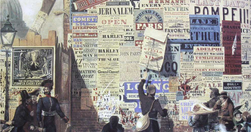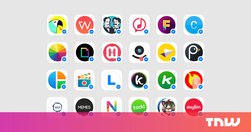There’s bad information out there that’s not necessarily fake. It’s never as clear-cut as you think... Facebook’s algorithm may not understand the various shades of falsehood. Facebook could tweak its algorithm to promote related articles from sites like FactCheck.org so they show up next to questionable stories on the same topic in the news fee…

Legacy media is thriving in Scandinavian news feeds... public broadcasters in all four countries seem to be competing strongly on Facebook... what do Scandinavian legacy publishers have to their advantage...?... many Scandinavian publishers see platforms such as Google and Facebook as only one part of their audience development strategy... small…

As Facebook attempted to capture the fast-moving energy of the news cycle from Twitter... it built a petri dish for confirmation bias... Here’s how... ‘Share’ Button ... encouraging people to share quickly and without much thought... “original sharing,” where people post their own photos, text updates... was declining..., content from celebritie…

Facebook seems incapable of rooting out hoaxes even after acknowledging they are clearly fake news... at least five different pages shared a story after Facebook acknowledged it was fake and were still able to reach tens of thousands of people through the social network. None of the posts carry any warning that the content is fake... BuzzFeed anal…
“So far, the growth around online video news seems to be largely driven by technology, platforms, and publishers rather than by strong consumer demand,”

a lot of media sources you don’t recognize ... a new and distinctive sort of operation ... political news and advocacy pages made specifically for Facebook... engineered to reach audiences exclusively in the news feed... Occupy Democrats; The Angry Patriot; US Chronicle... together make up 2016’s most disruptive, and least understood, force in med…

Do we want Facebook to act as a news site? It certainly never started out that way... it actively didn’t want to be impartial — it wanted to be personalized.... Facebook doesn’t care one way or the other, as long as people see what they want. Yet we, as users, made Facebook into a news source...Facebook turned to curation, fueled in part by humans…

There is no such thing as neutrality when it comes to media. That has long been a fiction... It’s also dangerous to assume that the “solution” is to make sure that “both” sides of an argument are heard equally... It is even more dangerous, however, to think that relying more on algorithms will remove this bias.Recognizing bias and enabling process…

"trending” section of Facebook... functions sort of like the front page of a newspaper...The difference comes down to a distinction in how newspapers and Facebook judge what’s important to their readers...Facebook is playing editor all the time—it’s just that we don’t recognize it, because the editorial influence takes a different form than it wou…
Ironically, with the widening of (national) news choices that the Internet has spawned, we’re depending on fewer pipelines of news. It’s a narrowing of the filter funnel...t as troubling as the filter bubbles that used to occupy our concerns, but likely more potent. As those pipelines narrow, necessarily, the decision on what is news, and what is …

SOMETHING REALLY DRAMATIC is happening to our media landscape, the public sphere, and our journalism ... without the level of public examination and debate it deserves. news publishers have lost control over distribution... increase in power of social media companies... a far greater concentration of power ... Networks favor economies of scale,…

bringing new technology into the newsroom to change how the outlet commissions and publishes opinion pieces ... expand the coverage beyond just text, into visual story formats that can be accessed and shared across different platforms.... the FT's comment section is a "huge source of strength and a very valuable asset".... a new Facebook commu…

“print dollars have turned into digital dimes, which are turning into mobile pennies.” Basically, even as we consume more news than ever, thanks to mobile’s proliferation, the revenue streams are actually diminishing... Where’s the money going to then, you ask? To Facebook, Google, and Twitter, the winners on mobile...As publishers turn more and …
By 2016, most content will be consumed ... on other people’s platforms... Snapchat Discover, Facebook Instant Articles, and Apple News... Google AMP is coming soon, and it will provide an Instant-like experience for not only Google users but also those using Twitter, Pinterest, and other platforms
the big media institutions knew that they really couldn’t leave their business models, they were locked in... there really is an open question to whether digital journalism will replace the profit margins of traditional journalism... one huge issue in journalism today is how a couple places, particularly Facebook, are becoming a major source of…

A quick post to Medium in response to: Facebook Will Be Every Publisher’s CMS And That Is Probably A Good Thing: For a publisher to adopt Facebook as their CMS would be a form of surrender, handing over their future to someone else. - I don’t know if you’re wrong, but I hope you are — Medium

Facebook... have, as I speculated earlier, built their system around RSS. This means there can be interop between all the big companies --Twitter, Google, Apple, Facebook -- now building new news systems... No publishing silos. Let news flow where it wants to. And let competitors arise who may do more interesting and useful things with news tha…
One of the best longreads re: the future of news media I've read in a while: "Websites... have been able to accumulate enormous audiences with incredible speed by harvesting referrals from social networks... Websites plausibly marketed these people as members of their audiences, rather than temporarily diverted members of a platform’s audience.…

"AOL's online dominance was such that building sites for the traditional web became secondary ... Companies fought over who had the best relationship with AOL, thereby allowing them access to audiences that their competitors didn't have.... If you're starting to think that 1995 AOL sounds a lot like 2015 Facebook, you'd be right. 20 years late…

"the most crucial element of Facebook’s new power: the right to chose between the free expression of ideas or to instead impose censorship when it deems content unworthy... How will its algorithms handle stories posted directly to Facebook that question Facebook’s monopoly status? ... If the Washington Post posted its PRISM story about collusion …
"Skeptics are howling that this is a Faustian bargain—that the media are mortgaging their long-term futures for short-term gain... Facebook has presented the news media with a collective-action problem. News sites aren’t blind.... if they could all get together and decide, as a group, what to do about Facebook, no doubt they’d think long and hard…

"The problem is that Facebook controls what you see and when. If it becomes the primary way to consume news and watch videos, what happens when a news story is controversial about the company itself? Or isn’t within its content guidelines (like pornography)? You’ll be receiving a filtered version of the internet that’s controlled by one company."

"The New York Times is preparing to plant a taproot right inside the highly walled garden that is Facebook." - Memo To Publishers: Watch Where You Put That Taproot… — Medium
"the idea of distributed content argues that publishers should be more comfortable putting their content on platforms they don’t control. But Facebook isn’t just another platform. It’s dominant in a way no other platform is... the sort of decision that one might look back on in a few years as the moment you got swindled" - Facebook wants to be t…

"The news media sector has become heavily dependent on traffic from Facebook and Google. A reliance now dangerously close to addiction. Maybe it’s time to refocus on direct access... Which company in the world wouldn’t be seen as fragile when depending so much on a small set of uncontrollable distributors? for a news, value-added type media, the…

After the standard survey of Facebook's impact on news & democracy, an interesting analysis of the way Facebook's: "trending topics has had a deeply pernicious effect on the way news is produced... encourages publications to look for what's trending and pump out something on that subject as quickly as possible... lots of quickly aggregated p…
As I mentioned in my previous post, the past couple of years have seen a lot of innovation in online content strategy, coupled with growing disenchantment with "Big Internet".

Seems Zuck's taken Filter Bubble criticisms to heart, combining human & machine curation (now where have I heard that before?) to create what Techcrunch calls “content serendipity” (wish I'd coined that one): "Each Section combines stories chosen by Facebook’s human editors and surfaced by the Paper algorithm [from] a publication, blogger, publi…
FalseFacebook Paper: the video. Click the #fbpaper tag for some thoughts.

"You also can't add any site you want, as with a traditional RSS reader. Instead, Facebook has hired a team of content curators to pick stories for you in one of a dozen or so categories ranging from basic news to cute animals." - With Paper, Facebook just blew its own iPhone app out of the water | The Verge